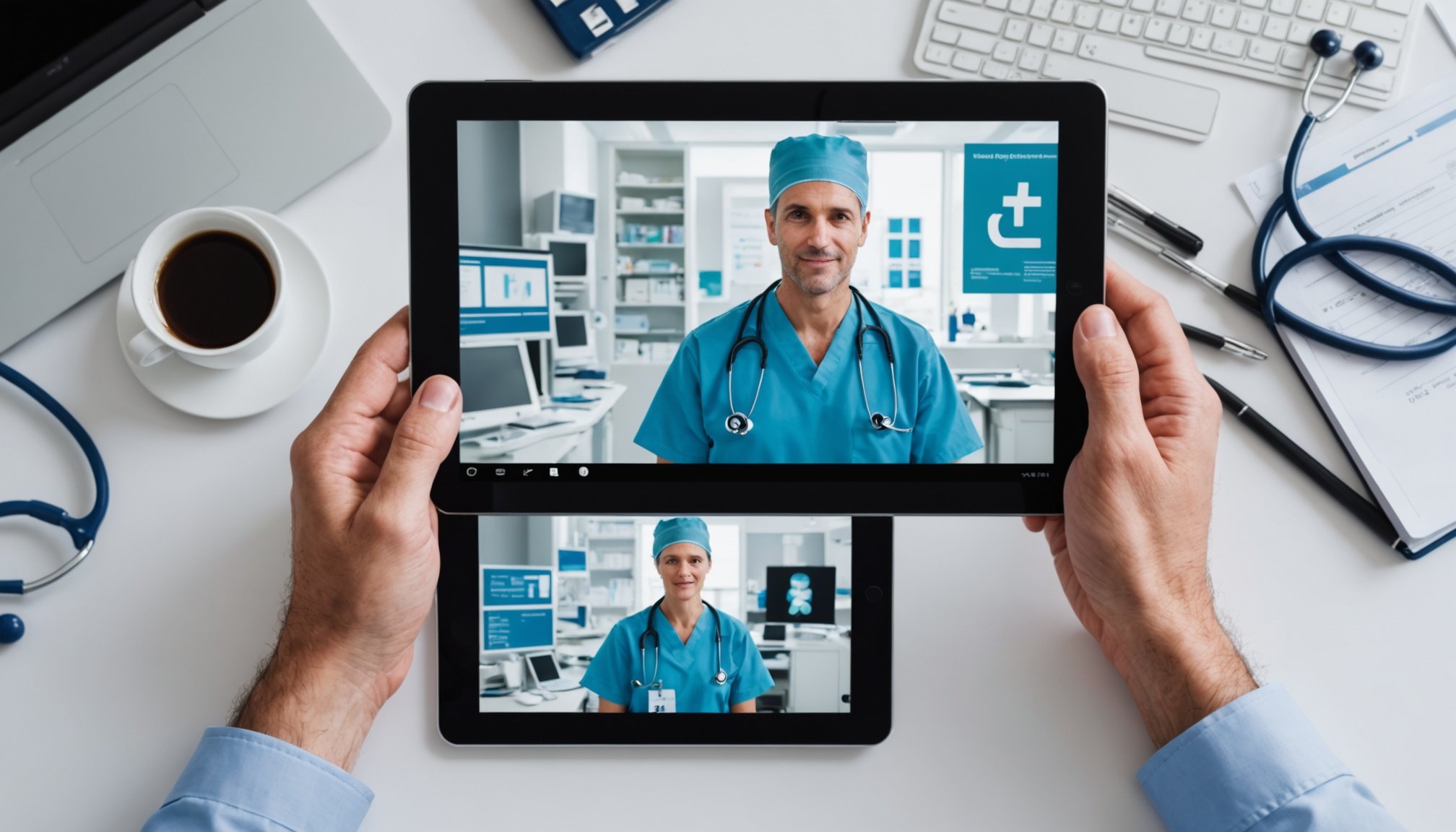In a rapidly evolving world, technology has emerged as a pivotal force in reshaping various sectors, not least the healthcare system. Particularly in the United Kingdom, technological advancements have revolutionized how healthcare services are delivered, improving patient care and enhancing outcomes. As we delve into the realm of UK’s healthcare, this article explores the profound influence of technology on medical practices, patient experiences, and overall healthcare infrastructure. Understanding these dynamics is crucial for stakeholders seeking to harness the full potential of digital innovations in the healthcare sector.
Enhancing Patient Care with Telemedicine
Telemedicine stands as a hallmark of modern healthcare, providing patients with unparalleled access to medical professionals regardless of geographical constraints. The UK healthcare system has keenly integrated telemedicine, especially in response to challenges posed by the global pandemic. This section examines how telemedicine has transformed patient care, making healthcare more accessible and convenient.
Also read : How is the UK addressing the gender pay gap across various sectors?
Telemedicine enables patients to consult with specialists from the comfort of their homes, reducing the need for physical visits and sparing them from long wait times. This accessibility is particularly beneficial for individuals residing in remote areas or those with mobility issues. Moreover, telemedicine allows healthcare providers to monitor chronic conditions more efficiently, ensuring timely interventions and personalized care plans.
The advent of virtual consultations also bolsters continuity of care, as electronic health records facilitate seamless sharing of patient information among healthcare providers. This ensures that patients receive consistent and informed care, regardless of who is attending to them at any given time. Additionally, telemedicine has played a significant role in reducing the burden on hospitals and clinics, freeing up resources for critical cases.
Also to read : What are the most effective strategies for promoting diversity and inclusion in UK businesses?
As telemedicine technologies continue to evolve, its role in the UK healthcare system is poised to expand further, offering innovative solutions to ongoing healthcare challenges. The integration of artificial intelligence in telehealth platforms holds the promise of even more precise diagnostics and treatment recommendations, paving the way for a more proactive approach to healthcare.
Digital Health Records: A Backbone of Modern Healthcare
Digital Health Records (DHRs) have become an indispensable component of the UK healthcare infrastructure, fundamentally altering how patient data is managed and utilized. This section explores the role of DHRs in streamlining healthcare processes and enhancing patient outcomes.
The transition from paper-based records to electronic systems has significantly improved the efficiency of data retrieval and management. Healthcare professionals can now access comprehensive patient histories at the click of a button, facilitating informed decision-making and reducing the risk of errors. This seamless access to data ensures that healthcare providers have the necessary information to tailor treatments to the unique needs of each patient.
Moreover, DHRs enhance the coordination of care. With shared access to patient records across different healthcare settings, there is a cohesive approach to treatment plans, reducing redundancies and avoiding potential conflicts in medication or therapy. This integrative system also allows for efficient communication among multidisciplinary teams, fostering collaboration in complex cases.
Patients themselves benefit from DHRs, as they have increased access to their medical information, empowering them to actively participate in their healthcare journey. This transparency strengthens the patient-provider relationship, leading to improved adherence to treatment plans and better health outcomes.
The security of digital health records remains a paramount concern, necessitating robust measures to protect sensitive information. The UK continues to invest in cybersecurity to ensure that patient data is safeguarded against breaches, maintaining trust in the digital healthcare ecosystem.
Wearable Technology: A New Frontier in Preventive Health
Wearable technology has become a buzzword in the health industry, heralding a new era of personalized and preventive healthcare. In this section, we delve into how wearables are shaping the UK’s healthcare landscape by empowering individuals to take charge of their health and well-being.
Devices such as fitness trackers and smartwatches have gained popularity due to their ability to monitor various health metrics in real-time. These gadgets track physical activity, heart rate, sleep patterns, and even stress levels, providing users with valuable insights into their health status. By facilitating self-monitoring, wearables encourage individuals to adopt healthier lifestyles, reducing the risk of lifestyle-related diseases such as obesity and heart disease.
The integration of wearable technology into the healthcare system also enhances the ability of healthcare providers to offer personalized care plans. By analyzing data from wearable devices, doctors can make evidence-based recommendations tailored to individual needs. This not only improves the accuracy of diagnoses but also enables early detection of potential health issues, allowing for timely interventions.
Furthermore, wearables have proven invaluable in managing chronic conditions. Patients with conditions such as diabetes or hypertension benefit from continuous monitoring, which ensures that any deviation from normal levels is promptly addressed. This real-time data collection helps in maintaining tighter control over chronic diseases, ultimately improving patient outcomes.
As wearable technology continues to advance, its potential applications in the healthcare sector are boundless. From early disease detection to rehabilitation support, wearables are set to play an increasingly significant role in preventive health strategies, contributing to a healthier population.
Artificial Intelligence: Revolutionizing Diagnostics
Artificial Intelligence (AI) is no longer a futuristic concept but a reality transforming the diagnostics landscape within the UK’s healthcare system. In this section, we explore how AI technologies are enhancing diagnostic accuracy, improving patient outcomes, and streamlining healthcare processes.
AI algorithms are capable of processing vast amounts of healthcare data at incredible speeds, identifying patterns that may elude human analysis. This capability is particularly impactful in radiology, where AI-assisted imaging can detect abnormalities in scans with precision, reducing the likelihood of missed diagnoses. Such advancements accelerate the diagnostic process, allowing patients to receive timely and appropriate care.
Beyond imaging, AI is instrumental in predicting disease outbreaks and identifying at-risk patient populations. By analyzing trends in healthcare data, AI systems can anticipate potential health crises, enabling healthcare providers to allocate resources effectively and implement preventive measures.
Moreover, AI-powered chatbots and virtual assistants offer round-the-clock support to patients, addressing queries, and providing health advice. This not only enhances patient engagement but also alleviates pressure on healthcare staff, allowing them to focus on more critical tasks.
Despite the tremendous potential of AI, challenges remain, particularly in ensuring the ethical use of AI technologies and maintaining patient privacy. The UK healthcare system is committed to addressing these challenges, establishing guidelines for the responsible implementation of AI in healthcare.
As we navigate through an era defined by technological innovation, the role of technology in transforming the UK healthcare system is undeniable. From telemedicine to artificial intelligence, each technological advancement contributes to a more efficient, accessible, and patient-centered healthcare model. While challenges remain, the benefits of embracing digital solutions are profound, paving the way for a future where healthcare is more proactive, preventive, and personalized.
Stakeholders must continue to collaborate and invest in technological advancements, ensuring that the UK remains at the forefront of healthcare innovation. By doing so, we uphold our commitment to delivering high-quality care to every patient while adapting to the evolving needs of our society. As technology continues to evolve, so too will the opportunities to improve health outcomes and enhance the overall healthcare experience for all.











